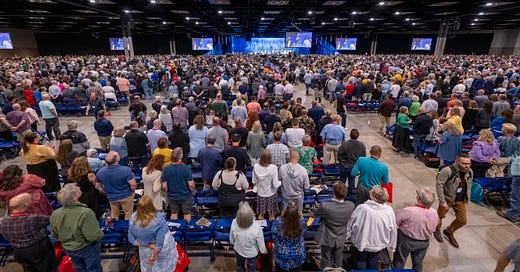Last week, I attended the 2025 Southern Baptist Convention Annual Meeting. I’ve been to several conventions over the past few years, and like many fellow Southern Baptists, I carry concerns about doctrinal drift, entity accountability, and transparency. While not every vote went the way I had hoped, I left the meeting with renewed gratitude to be part of a denomination that still believes in the authority of Scripture and the mission of the local church.
However, one recurring issue continues to weigh heavily on my heart—our denomination’s engagement with the disability community.
In recent years, faithful Southern Baptists have repeatedly called attention to the urgent need for better resourcing and equipping of churches to minister to individuals and families with disabilities. At this year’s meeting, three separate motions were submitted that point to a growing groundswell of concern:
Benjamin Hankin (NJ) moved that the Executive Committee form a task force to study resources for special needs ministry available to SBC churches.
Shannon Diehl (MD) moved that the North American Mission Board develop and grow special needs ministries.
Sandra Peoples (TX) moved that the SBC consider adding an official “Disability Ministry Sunday” to our denominational calendar.
This is not the first time such a request has been made. In fact, last year, Benjamin Hankin submitted a nearly identical motion requesting that the Executive Committee (EC) form a task force to study how SBC churches are engaging the disability community and provide guidance on how to grow these ministries.
The 2024 motion read in part:
“This report would also include recommendations on how SBC churches could implement processes and procedures to help them start special needs ministries, further equip churches for special needs ministries, and also provide encouragement for those already engaged in special needs ministries as well as those seeking to begin special needs ministries.”
The Executive Committee Responded with the Following
Despite affirming the importance of ministering to those with disabilities, the Executive Committee ultimately declined to create such a task force. Instead, they directed churches to a single webpage—SBC.net/specialneeds—as the hub for existing resources and encouraged churches to make use of what's already available.
While I appreciate any effort to centralize helpful tools, I believe this response falls short of the moment. A webpage is not a strategy. Affirmation is not action. And pointing to isolated resources is not the same as coordinated leadership. The repeated motions from messengers make it clear: the local church is asking for help.
I speak not only as a pastor but as a father. My two sons both live with severe disabilities—one with profound autism, the other with a complex genetic condition and congenital heart disease. My family lives this reality every day. We know what it’s like to enter a church unsure if there will be a place for our children. We know how vital it is to be part of a congregation that sees our boys not as burdens but as blessings. And we know just how many families have quietly left our churches because they didn’t feel seen, welcomed, or equipped to stay.
That is why this moment matters. Disability ministry is not an optional extra for churches—it is a test of whether we believe what we say about the dignity of every human life and the mission of the gospel going to the ends of the earth, including those who might never speak a word or walk on their own.
What Can You Do?
If you’re reading this and wondering how to help, here are a few practical steps:
Start where you are. Ask if your church is intentionally welcoming and supporting families impacted by disability. Do you offer sensory-friendly spaces? Respite opportunities? Disability-inclusive teaching?
Equip your leaders. Partner with parents, therapists, or special education professionals in your community to build teams and strategies for care.
Contact your state convention. Ask what disability ministry resources or networks are available in your area. Advocate for more visibility and support within your state.
Speak up within the SBC. If you're part of a Southern Baptist church, reach out to your state’s representative on the SBC Executive Committee. Let them know this issue matters to you. Encourage them to revisit the idea of forming a dedicated task force, or at the very least, offer clearer pathways for equipping and supporting our churches.
The SBC has done important work on many fronts—church planting, disaster relief, theological education. But if we cannot or will not take concrete steps to support families impacted by disability, we risk neglecting a mission field right in our own pews.
Let us not be content with kind words and static web pages. Let us move forward with conviction, creativity, and compassion—because every member of the body of Christ matters.
If you are a pastor, advocate, parent, or person with a disability I would like to invite you to join the Southern Baptist Disability Fellowship.
If you are looking for a good book to read on the topic of Disability and the Local Church check out this recently published book by Sandra Peoples.




